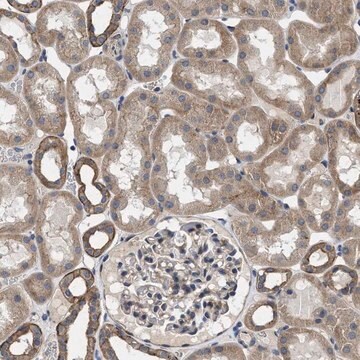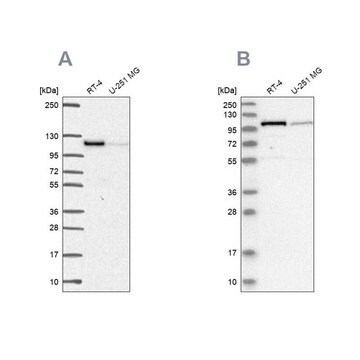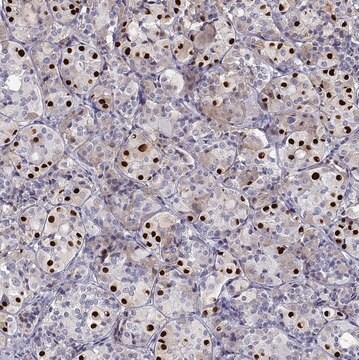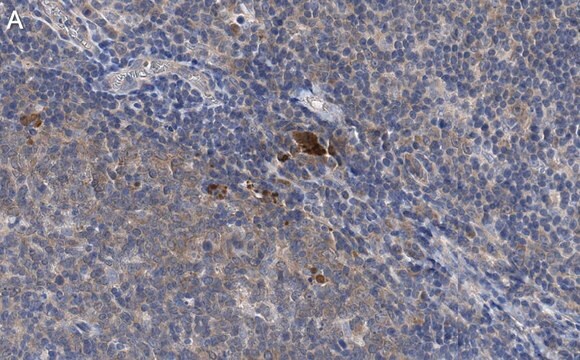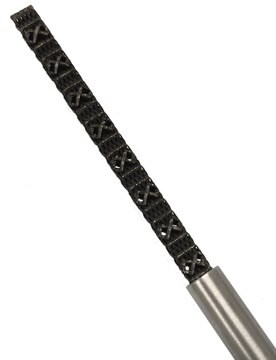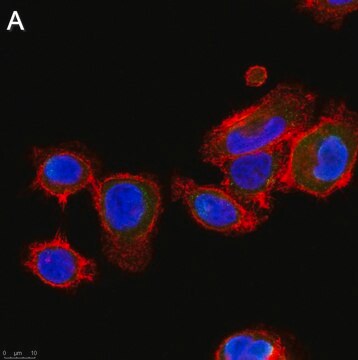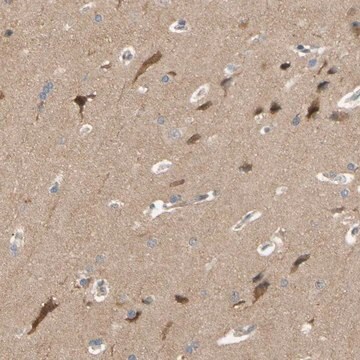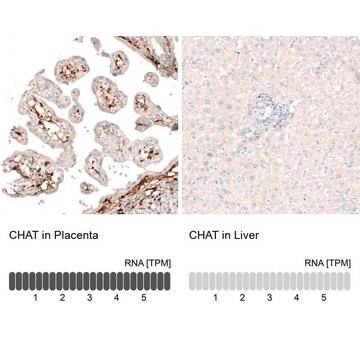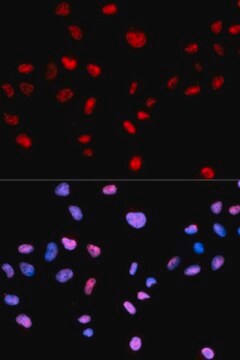추천 제품
생물학적 소스
rabbit
결합
unconjugated
항체 형태
affinity isolated antibody
항체 생산 유형
primary antibodies
클론
polyclonal
양식
buffered aqueous solution
분자량
antigen 96 kDa
종 반응성
mouse, human, rat
농도
~1 mg/mL
기술
ELISA: 1:60000
western blot: 1:500-1:1000
NCBI 수납 번호
UniProt 수납 번호
배송 상태
wet ice
저장 온도
−20°C
타겟 번역 후 변형
phosphorylation (pSer876)
유전자 정보
human ... PRKD2(25865)
일반 설명
The protein kinase D2 (PRKD2) gene, mapped to human chromosome 4q21-23, codes for integral membrane protein polycystin-2. PRKD2 is a member of the serine/threonine protein kinase D (PRKD) family. It is characterized with two N-terminal cysteine-rich zinc finger domains involved in binding diacylglycerol (DAG) and phorbol esters, a central lipid/protein binding pleckstrin homology (PH) domain, and a C-terminal kinase domain. PRKD2 is mainly expressed in the endoplasmic reticulum (ER).
면역원
The antiserum was produced against synthesized peptide derived from human PKD2 around the phosphorylation site of Ser876.
Immunogen Range: 829-878
Immunogen Range: 829-878
생화학적/생리학적 작용
Protein kinase D2 (PRKD2) is a novel, essential mediator of tumor cell-endothelial cell communication and a promising therapeutic target to inhibit angiogenesis in gastrointestinal cancers. Mutation in the gene leads to autosomal dominant polycystic kidney disease (ADPKD). Polycystin-2 might function as a component of intracellular channel complexes. PRKD2 influences CD8+ T cell-dependent immune responses. PKD2 facilitates cell migration and it is associated with the progression and maintenance of various malignancies. Increased expression of PKD2 is observed in various types of cancers including colorectal cancer, glioblastoma multiforme (GBM). CRT0066101 acts as an inhibitor for all the three protein kinase D isoforms. Therefore, it can be used as a therapeutic drug for PRKD2 induced carcinogenesis.
특징 및 장점
Evaluate our antibodies with complete peace of mind. If the antibody does not perform in your application, we will issue a full credit or replacement antibody. Learn more.
물리적 형태
Rabbit IgG in phosphate buffered saline (without Mg2+ and Ca2+), pH 7.4, 150mM NaCl, 0.02% sodium azide and 50% glycerol.
면책조항
Unless otherwise stated in our catalog or other company documentation accompanying the product(s), our products are intended for research use only and are not to be used for any other purpose, which includes but is not limited to, unauthorized commercial uses, in vitro diagnostic uses, ex vivo or in vivo therapeutic uses or any type of consumption or application to humans or animals.
적합한 제품을 찾을 수 없으신가요?
당사의 제품 선택기 도구.을(를) 시도해 보세요.
Storage Class Code
10 - Combustible liquids
WGK
WGK 1
Flash Point (°F)
Not applicable
Flash Point (°C)
Not applicable
가장 최신 버전 중 하나를 선택하세요:
Nisha Durand et al.
Journal of clinical medicine, 5(2) (2016-02-06)
The Protein Kinase D (PKD) isoforms PKD1, PKD2, and PKD3 are effectors of the novel Protein Kinase Cs (nPKCs) and diacylglycerol (DAG). PKDs impact diverse biological processes like protein transport, cell migration, proliferation, epithelial to mesenchymal transition (EMT) and apoptosis.
Y Cai et al.
The Journal of biological chemistry, 274(40), 28557-28565 (1999-09-25)
PKD2, the second gene for the autosomal dominant polycystic kidney disease (ADPKD), encodes a protein, polycystin-2, with predicted structural similarity to cation channel subunits. However, the function of polycystin-2 remains unknown. We used polyclonal antisera specific for the intracellular NH(2)
I Plastira et al.
Journal of neuroinflammation, 14(1), 253-253 (2017-12-21)
Extracellular lysophosphatidic acid (LPA) species transmit signals via six different G protein-coupled receptors (LPAR1-6) and are indispensible for brain development and function of the nervous system. However, under neuroinflammatory conditions or brain damage, LPA levels increase, thereby inducing signaling cascades
T Mochizuki et al.
Science (New York, N.Y.), 272(5266), 1339-1342 (1996-05-31)
A second gene for autosomal dominant polycystic kidney disease was identified by positional cloning. Nonsense mutations in this gene (PKD2) segregated with the disease in three PKD2 families. The predicted 968-amino acid sequence of the PKD2 gene product has six
Ninel Azoitei et al.
Gut, 59(10), 1316-1330 (2010-08-25)
Tumour angiogenesis is crucially dependent on the communication between the tumour and the associated endothelium. Protein kinase D (PKD) isoenzymes mediate vascular endothelial growth factor-A (VEGF-A) induced endothelial cell proliferation and migration and are also highly expressed in various tumours.
자사의 과학자팀은 생명 과학, 재료 과학, 화학 합성, 크로마토그래피, 분석 및 기타 많은 영역을 포함한 모든 과학 분야에 경험이 있습니다..
고객지원팀으로 연락바랍니다.